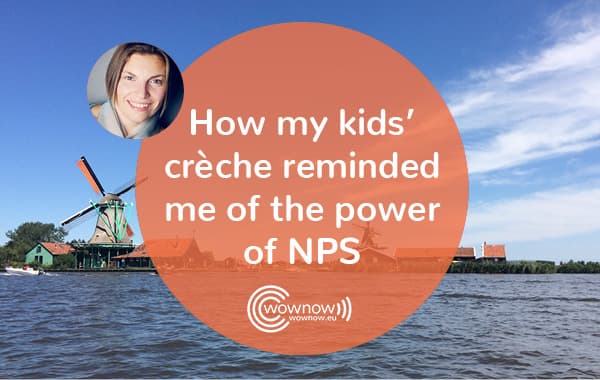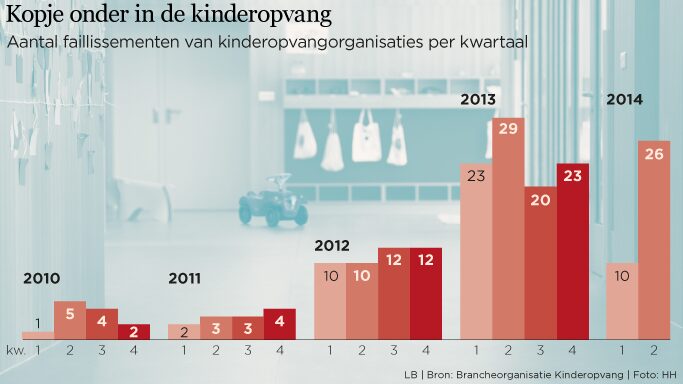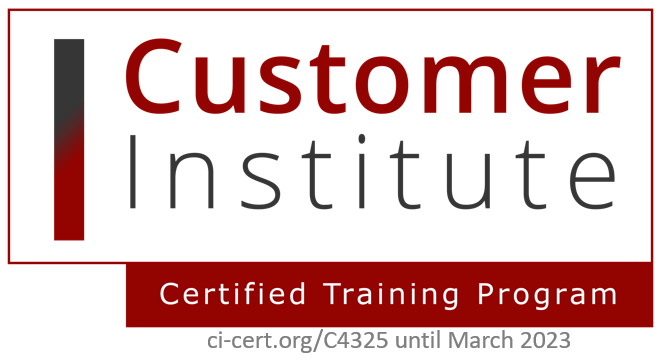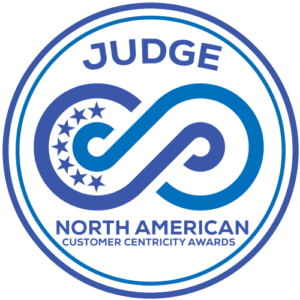Note: this blog post originally appeared on Wow Now blog in June 2014. On Saturday 22 November 2014, the decline of childcare industry was again in the Dutch news, and that prompted me to re-publish this post. Below a graph from the article showing the number of childcare organizations that declared bankruptcy in the past quarters. While many conditions are contributing to this situation, I do believe that the fact families are forced to find alternatives because of the disconnect between their needs and the offering plays a key role, as does positive (or negative!) word of mouth. Both are elements that organizations can proactively monitor and act upon using well-designed NPS surveys.
Number of childcare organizations that have filed bankruptcy in the past quarters.
What happened and how I felt as a “customer” of the crèche and as a (international) “mother” of two kids…
Yesterday it was sixmonths since I registered my company at the Chamber of Commenrce. Yesterday it was 7 months since I wrote my first post about my company mission and vision. Yesterday it was an indefinite amount of time since I have been procrastinating writing my next blog posts and organize the myriads of draft content I have to get my blog and website finally rolling.
When last week LinkedIn invited me to start publishing on their platform, I thought it was time to do it! I booked in an extra half day of crèche for my kids to finally MAKE the time (isn’t that what it just boils down to?) to write, edit and publish! And celebrate (because we need to make time for that too to build up energy) the 6th month birthday of my company.
That was the plan. But plans are done to be messed up, aren’t they?
Despite (or, maybe, thanks to) careful planning of the kids morning activities, timely lunch and getting everyone out of the house on time (my boys are nearly 2 and 3,5 years old. If you are not a parent, just trust me or read more here, especially test 4 and 6: getting them out of the house and from location A to B on time, it’s a major project deliverable with unpredictable timeframe), we arrived in the crèche (note: I highlight in because even from location car parking to entering the actual crèche door can take anything between 2 and 15 minutes purely depending on your kids’ mood, curiosity or will that day) at 12:40 instead of 12:45, 5 minutes earlier (I mean, five minutes earlier).
Since my little one was falling dead asleep on my shoulder, I asked the teacher whether I could put him down to bed immediately (knowing that doing that once he had completely fallen asleep might result in him waking up in terrible mood and make the whole separation process a separate crisis management event). Despite the fact that the actual rulebook says half day’s entrance can take place between 12:30 and 13 (which at that moment I didn’t recall since I hardly ever make use of half days), teacher A remarked that the half day starts at 12:45 (not 12:40), hence invited me to just wait in the hall until it was time. According to her, my kid should not be sleeping at that moment anyhow but later on the same schedule as another kid. I have never had such a remark from any other teacher there and, in fact, I always valued the flexibility of this crèche to accommodate the actual sleeping needs and patterns of each kid rather than pushing a fixed schedule over them.
A very long story short, despite all my attempts to communicate according to my latest learning of Non-Violent Communication from great teachers like Yoram Mosenzon and Cara Crisler, we ended up into an argument, and she kept going on about rules despite my request to stop this in front of the kids. While she made a phone call to the crèche manager, my children and I were left alone in the hall well past 12:45. During her call, teacher B allowed me to put my youngest one down to bed, which as expected woke up from the deep sleep he had fallen into and cried miserably when I left him to the teacher B. After the call, rather than finally admitting my oldest one as well (he was still in the hall, by now sorrowful and whining to go back home), teacher A’s priority became planning a meeting with the manager two days later, and she wouldn’t take “I’ll check my husband and my busy work agenda and let you know later today” as an acceptable answer.
How I acted as a “digital empowered” customer and as a (international) mother.
When I finally went back home, I was no longer in any mood to celebrate my company 6-month birthday or to write blog posts, because my heart was broken (my need of extra half day care had left my little one without healthy sleep, and my older kid experienced not feeling welcome at his crèche and witnessed a major argument between his teacher and his mum) and my head was busy about what to do next, considering all the possible consequences this episode might have on whether my kids will stay at this crèche.
So I did what most of us do these days:
- I turned to the most amazing mothers’ community in the Netherlands Amsterdam Mamas asking advise about how to handle this situation with the teacher/crèche and with my kids
- I posted a status update on my profile about the sadness I was feeling as mother and as an expat in the Netherlands
The results:
- The first post reached a community of local moms (these are all potential prospects or even customer of the bigger organisations behind my local crèche) that counts over 5000 members. I have no visibility on how many readers read the post, but at least 25 members either commented or liked someone else comment
- The second post reached only about 200 of my friends and had about 20 reactions between comments, likes and PMs, but some of these friends are from my very same neighbour and prospects/customer of my very same crèche; one of my friends was actually just considering signing up to my crèche her 2 kids for 4 days a week for the next two years (since the location she currently uses is about to close), and she sent me a private message that my post made her reconsider whether that was the place for her kids.
Conclusions and lessons learned
Then it hit me. Without even realising it, I have been acting like a proactive detractor spreading negative word of mouth just towards the most relevant and influential community for the company causing my rant.
So here are the key lessons learned fromCustomer Experience & NPS from this episode:
- Teacher A totally lacked empathy towards my feelings and needs as a mother in that moment: empathise, understand your customer feelings and connect to them. I was so pleased to see that, earlier this year, Temkin group started the Amplify Empathy movement and I enjoy reading their work on the topic of organizational empathy.
- Teacher A put the rules before the sleep health of my little one and the planning of a meeting with location manager before the welcoming of my older kid: this isn’t just bad service, this is also not being clear about what is the ultimate goal of your company. I thought our crèche priority was the healthy (physical and emotional) upbringing of our kids and all the needed rules and bureaucracy were a tool to achieve this. Teacher A ( the senior pedagogist at this location, and trains every other teacher) does not seem to reflect these priorities.
- The location manager (not working on Wednesday & Thursday) had time to have a call with Teacher A, but did not make time to call me after this incident and has not replied yet to our official request for a meeting: make sure you have a clear escalation policy and process in place and that these processes are available not only to your employees but also to your customers
- After the incident, there was absolutely no way for me as a customer to reach out to the company other than sending an email to the manager and wait for a reply. Hence, I turned to social media unaware I was becoming a talkative and influential detractor. Your customers are looking to connect with you as a company. Make sure you have channels available for them to do so
- In the past 2 years, this crèche’s location (and any other location in the wider organization) have been experiencing a major recession and downsizing: less kids for less days of the week (in NL you can sign up for anything between 1 to 5 days a week, with 2-3 days max being the most common subscription). As far as I can see as customer of the crèche organization, they don’t seem to be able to reverse the pattern and I wonder whether they have a clear idea about what the root causes of the issue and the possibility to fix it. As a customer, I receive at least twice a year the “ouderpanel” a short questionnaire rating my SATISFACTION with a number of services/categories and asking my INTEREST in some extra services or changes (i.e. different hours opening, etc…)
They are missing out on the “ultimate question”!!! NPS!!!
Their questionnaires have no link to “likelihood to recommend” so the information they collect about their customer’s satisfaction and/or interest stay as a “market research” exercise. It most likely (I might be wrong seeing & analyzing the situation as their client rather than as their consultant) doesn’t give any insight into whether offering or improving the services they question about will make a significant impact to their bottom line. Also, in their questionnaires, I always missed a free text question to be able to share what I – as their client – was unhappy about. In fact, it’s also because I had no formal channel to express my experience directly with the company, that yesterday I found myself asking advice and venting on social media.
NPS is still the most powerful measure of your customer experience and their likelihood to act upon such experience, whether this action involves recommending you good or poorly, increasing or diminishing consumption (i.e. more or fewer days at the crèche, upgrading or additional purchased in other industries) or walking away from you.
In my next posts, I will talk more about how to successfully implement the NPS methodology and how to embed it in your organization driving the critical change management it requires to generate intended results!
In the meantime, I would like to hear what’s your take on this example within the childcare industry. My feeling is that the NPS methodology hasn’t reached this industry yet, maybe due to limited (direct) competition on the market. What’s your experience and opinion?
NB> Our friends at Satmetrix want us to remind you that Net Promoter, NPS, and Net Promoter Score are trademarks of Satmetrix Systems, Inc., Bain & Company, and Fred Reichheld.



 A (little Italian) sunshine of energy, enthusiasm, and passion, with a mission to bring more happiness in the world one interaction at the time, the business world being my chosen playground!
I inspire and empower conscious leaders to nurture their happiness (moving from depleting to enriching emotions) and to move from depleting to enriching experiences, choosing, designing, and delivering WOW life-enriching interactions that contribute to everyone’s HAPPINESS, so they can achieve business and personal prosperity, making happiness their competitive advantage
A (little Italian) sunshine of energy, enthusiasm, and passion, with a mission to bring more happiness in the world one interaction at the time, the business world being my chosen playground!
I inspire and empower conscious leaders to nurture their happiness (moving from depleting to enriching emotions) and to move from depleting to enriching experiences, choosing, designing, and delivering WOW life-enriching interactions that contribute to everyone’s HAPPINESS, so they can achieve business and personal prosperity, making happiness their competitive advantage 










Thanks for sharing. I am so sorry about your experience but I personally see your situation in a completely different way.
I have been here in NL 20 years (am American) and have been an international mother for 6 of those years. And I have seen the change in the whole day care system, my daughter experienced 3.5 wonderful years in the ‘old’ subsidised system where the biggest problems were the waiting list. Her last half year
was when the subsidies were reduced and that is when things started to change.
A few comments:
1.NPS (net promoter score) it is a marketing term which basically puts a value on how strong the customer experience is and how much they will act as your brand’s ambassador – ie, promoting it to their friends.
We are talking the care of kids here and while, yes, a creche needs to make profits, demanding they pay attention to NPS on something based around children just does not seem to be a suitable term here. Kids are not a commodity, they are our future and they are an investment but one that goes beyond finances and profits and marketing scores.
‘Word of mouth’, perhaps, seems more suitable to describe what you are referring to – but let us not use marketing terms
meant for MBA businesses. (Back when our daughter was in the creche I had experiences with ‘Big Brand’/run-like-an-MAB-business arrogance in some day care centers because they were filled and had ridiculous waiting lists – and no threat of losing business – so if you did not sign up or withdrew they didn’t care. Our first was like that but fortunately our second creche was brilliant. So it can work both ways.)
2. The reason we are in this situation is actually because of two things, one of them being that about 10 or so years ago creches in the Netherlands- which had been more more subsidised – became fully privatised and thus run like MBA businesses, rather than an institution based on caring for our children and allowing mothers to work. It was not quite the Scandinavian model (which places early childhood care on the level of primary school and so those institutions are free AND modern AND effective AND run by highly educated experts), but it was in my eyes more realistic about their purpose.
These newly fully privatised businesses were bought primarily by wealthy investors from the US and listed on the stock markets. And so they started to be run with those MBA models that were not designed for sustainability and supporting societies but more for earning ‘instant gratification’ profits for the top level management and the shareholders. Low and behold many of those day care companies could not sustain themselves because so many profits had to go to the owners and shareholders.
3. Another reason for their failure is that the government cut the
subsidies drastically about 3 years ago, so that meant more people withdrawing their children and not signing up. Now they had to run like an MBA business without mass amounts of clients that made them interesting to investors to begin with and without a functinal purpose that suits the MBA model.
4. While I absolutely agree a creche needs to work with the parents and children, you also have to realisitic about your demands. They probably have these rules about bedtimes etc because their whole entire schedule evolves around caring for a lot of small babies and children who depend on them and in order to avoid chaos those schedules are needed. Regularity is also proven to be an important factor in a child’s wellbeing. So to disturb an entire schedule because you did not want to wait 5 minutes seems like a big demand on people who regardless of their ridiculously
low paycheck are actually working really hard at a very important job.
It is one thing to make that demand when you have an appointment at a bank, another when 10-20 babies and children are involved and you are basically asking the caregivers to turn their entire schedules around for you.
You did not write about how you specifically approached them, but my guess is if you got demanding or raised your voice even a little you lost the game from the beginning. Here in the Netherlands you will find that you will catch more flies with honey than vinegar here. Getting frustrated and demanding if you do not get your way will most always end in you losing your battle. You have to approach them with an open mind, in a friendly and pragmatic way, with an understanding that it is not only about you and your child but them as well and the other children. This most likely had everything to do with your non-Dutch approach and not much to do with your actual demands. With the Dutch, you have to approach them in a way that shows you are open to finding the best solution for everyone, not just for you.
So the idea here is not so much client is king, which means (like in the US where I am from) that a client can get demanding or even sometimes insulting and still be right. It is not based on ‘You are in a service job and thus I am higher on the hierarchy than you are’. It is more based on ‘We are both humans so we need to find a solution that works for both of us’.
You may not be used to it or may not even agree, but this is
where we live now so if you want to achieve things my suggestion is to approach it with that mindset, you will achieve a lot more than
frustration.
So do think twice before using your ‘net promoter’ influence to lambast your creche on a forum over something like not wanting to wait 5 minutes. Save it for real serious issues, like the true neglectful care or endangerment of a child. Or true rudeness not abused on anything you may have added to the situation.
My 2 cents and clearly a strong opinion from my side, but one based on experience here and yeah, if you are going to publish your opinion I hope you are open to hearing others who may disagree without taking it personally. Another nice Dutch quality if you ask me. 😉
I fully respect your experience and ideas, I just have a very different viewpoint. For me, the MBA business model (which produced terms like NPS) is one based on a very masculine model and it is time for a more feminine energy and mindset in viewing our businesses – particularly when it comes to businesses that are about nurturing the future of our society and allowing more women to work they way they want. It is time to change the model and look for a higher ground here.
Sara, thank you so much for engaging in this conversation. I really valued your comment, above all as you raise many thought-provoking points. Let me try and see if I can answer some of them, or clarify in cases
where I’m not sure my message came through as intended.
1. Net Promoter Score it’s for me really just a
“tool” to collect Voice of Customer, a very simple indicator for companies about their customer sentiment and “word of mouth” potentiality. In point 1,
9,10 of my post “10 basics things to know about NPS” (
https://wownow.eu/10-basics-things-know-nps-net-promoter-score/ ) I highlight that more than about Net Promoter, I believe in the Net Promoter System and I will soon post more about this. While NPS might be a marketing “term,” it is also today reality that
consumers make decisions based on recommendations from friend and colleagues, beside of course their own experiences. I totally agree about your point
regarding children and, in fact, I didn’t mean to go at all into covering anything related to the pedagogic method used by crèche, which I’m very happy about and
that is reviewed in totally different context (like for example the Oudercommissie, of which I’m a member). My conclusion were merely abstracting
from specific company business context (children education) and were generalizing about the relationship between a customer and a company via a
“retail branch”, which is what the crèche location could be compared too when owned by a wider organization with many locations.
2. & 3. The economics of the model and of the
subsidies, which surely play a key role, were outside the scope of my remarks.
Regardless of the system (private, subsidized or non-profit) or of the financial models, I believe that any business should operate keeping in mind
its end customer needs, listening and understanding them (well-designed Net Promoter or Satisfaction surveys are one way to do so, having a good escalation
procedure is another, and so is open dialog), and then working out solutions to match these needs, continuously re-evaluating what works and what doesn’t. I’m reminded of an article I read just yesterday about how this approach should be used also in NGO: “Stop
Trying to Save the World” (http://www.newrepublic.com/article/120178/problem-international-development-and-plan-fix-it ). NPS survey is just one of the many tools to do so and not the best tool in every possible situation.
4. I’m totally aware of the crèche timing rules, of
the reasons behind the first no (fear of GDD control) and of the difference between request and demands. My overall idea of service and customer experience
is not based around the US model “customer is king”. In fact this is an “old” way of looking at it, that I see also US though-leader in customer experience
are reconsidering (in my post I’m already quoting the Temkin Group and their Amplify Empathy initiative). My idea of customer experience is centered on empathic
listening and non-violent (or compassionate) communication. I fully believe that there is no more B2C or B2B, but H2H (human to human). In the specific crèche case, teacher A was the one who was missing the empathic approach, which was soon provided by
teacher B, in fact. And because it’s H2H, sometimes people will disagree. In these cases, I believe that a) companies’ employee should have total clarity on
what is the ultimate goal of the company and act accordingly, b) an escalation process should be equally available for the employee and for the client, c) if there
are official channels for customers to “voice their feedback”, then customer will use these channels before turning to social media. The experience I shared
in this post was for me a reminder that all these points are not in place for this specific organization and an opportunity to use a practical example to share some recommendations.
All in all, I don’t think we necessarily have different
views. And even if this would be the case, I’m surely open to everyone comments and opinion. My objective is not to post “truths” (I don’t think there are generally valid truths), but to share learnings and opinions and engage in
conversations, just like we did, as they trigger more learning.
Your comments are a great feedback to me to sharpen my writing to be clearer on my view and my message, which will most likely get clearer also as I will post more content.
Lastly, I was really triggered by your last sentence about
NPS being a very masculine model versus a feminine model. Why do you see in that way? Would you like to elaborate more on that?